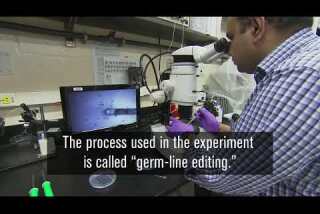Biomedical research feels cuts of President Trump’s new budget proposal
- Share via
Despite some good aspects, President Donald Trump’s proposed 2018 budget includes cuts in biomedical programs that would cripple life science research and industry, said experts in San Diego and California’s biomedical economy.
“It’s a horrendous proposal,” said Eric Topol, M.D., a cardiologist-geneticist with Scripps Health. “It’s completely unacceptable. It can’t be defended ... Every way you look at it, it spells trouble.”
The proposed cuts also come at a time when biomedical research has become extraordinarily productive in finding new treatments and insights into human health, Topol said.
Sara Radcliffe, president and CEO of California Life Sciences Association, said in a statement that the biomedical trade group is “deeply concerned with the administration’s requests related to public health and research priorities, including funding for the U.S. Food & Drug Administration (FDA) and the National Institutes of Health.”
NIH is the nation’s largest funder of biomedical research. The budget would fall 22 percent, or about $7.7 billion, to $26.9 billion. Nearly all of its component institutes would get a drop in funding.
-- National Cancer Institute would get $4.47 billion a loss about $1 billion
-- National Institute of Allergy and Infectious Diseases would get $3.78, a loss of $838 million
-- National Institute on Aging is to get $1.3 billion, a loss of $294 million.
The budget does contain some new spending, including $207 million for the Department of Health and Human Services to respond in case of an influenza pandemic, an increase of $135 million.
Radcliffe praised the administration’s proposed repeal of the Independent Payment Advisory Board, established with Obamacare. Radcliffe said the board “could harm biomedical innovation by reducing incentives for investment in new research and product development.
Joe Panetta, president and CEO of Biocom, the San Diego-based life science trade group for California, said the combination of cuts to the NIH, the Food and Drug Administration, the Centers for Disease Control and Prevention and the National Science Foundation would be “devastating,” said .
Not only would research be hurt, but cutting CDC and FDA budgets would reduce their ability to monitor and treat diseases.
“This budget is taking us in the wrong direction,” Panetta said.
The cuts will hurt the large biomedical economy in San Diego and across California, Panetta said. NIH grants pour hundreds of millions into San Diego area research institutes. Other programs, such as Small Business Innovation Research grants, help companies advance technologies so they can be commercialized.
Topol said the methods used to effect the budget savings will also disrupt research, Topol said. High on the list of disrupters is a limit of 10 percent in grants to cover indirect costs.
“It supports, it doesn’t pay for everything, but it supports the things that are necessary for people to do the research, the space, the utilities, the basic infrastructure that it takes to do biomedical research,” Topol said of the indirect cost grants.
Indirect costs are currently calculated on a percentage determined for each institution, based on audited data, Topol said. Rates often range from 40 to 50 percent, and in some cases all the way up to 90 to 100 percent, Topol said.
“To suddenly make that 10 percent would basically cripple all biomedical research,” Topol said.
The NIH has recently advanced a good proposal to fund more young researchers by giving them priority, he said. But the budget reductions will have the opposite effect, by discouraging young researchers who are trying to get their feet on the ground.
Panetta said a proposal to fund the FDA by charging about $670 million in user fees to biomedical companies for reviewing their products could make the agency too dependent on the biomedical industry.
These users fees were introduced in the early 1990s to helps the FDA pay for the expense and time of the review process. User fees are a good idea, Panetta said, but the proposed increase take that concept too far.
“The industry’s already paying 80 percent of the budget in user fees,” Panetta said. “Can the industry afford it? Yeah, I think the industry can afford it, but that’s not the issue,” Panetta said. “How much of the FDA do you want to be funded by the industry? Do we go to 90 percent? Do we go to 100 percent?”
In a statement, the nationwide Biotechnology Innovation Organization expressed a mixture of praise and concern about Trump’s proposed budget.
“While we are still reviewing the details of today’s proposed budget, we are encouraged by the proposals to clarify the treatment of value-based purchasing arrangements and to promote enhanced sharing of scientifically sound information between manufacturers and payers,” BIO President and CEO Jim Greenwood said in the statement.
Like Radcliffe, Greenwood also praised the proposed elimination of the Independent Payment Advisory Board.
“However, we have concerns about the proposed re-opening of technical FDA user fee negotiations as well as some of the proposed funding levels for key scientific and public health preparedness programs,” Greenwood said. “We look forward to working with Members of Congress on both sides of the aisle, as well as the Administration, to ensure that these critical programs supporting public health and basic biomedical and biobased technologies research receive adequate funding.”
Science Playlist


In a first, scientists rid human embryos of a potentially fatal gene mutation by editing their DNA

10 interesting facts about Mars

Kids can add years to your life

LA 90: SpaceX launches recycled rocket

Ocean temperatures warming at rapid rate, study finds
bradley.fikes@sduniontribune.com
(619) 293-1020
More to Read
Inside the business of entertainment
The Wide Shot brings you news, analysis and insights on everything from streaming wars to production — and what it all means for the future.
You may occasionally receive promotional content from the Los Angeles Times.











